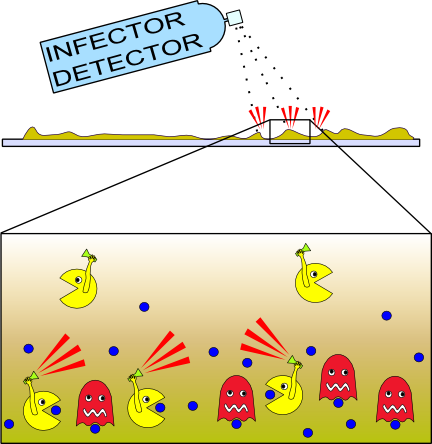Imperial/Project Description
From 2007.igem.org
m |
|||
| Line 8: | Line 8: | ||
[[image:IC07_cellbydate.png|thumb|left|340px|Cell By Date]] | [[image:IC07_cellbydate.png|thumb|left|340px|Cell By Date]] | ||
| - | Our | + | Our contribution to the synthetic biology community will be the investigation of a '''Cell-Free Chassis''', the common platform on which '''Cell By Date''' and '''Infector Detector''' will be built. The cell-free approach is particularly useful for VesoCops to operate in the medical and food industries. We believe that the characterization of this cell-free chassis will unlock fresh potential in simple constructs. Our project strategy is based on the '''Engineering Cycle''', of which we have completed specifications and design of the systems. We are starting on modelling and implementation, and we aim to test our final constructs in the new chassis. We hope that by the end of the summer, the VesoCops will be ready to start their investigations. |
Latest revision as of 19:39, 8 August 2007
VesoCops - Imperial College iGEM 2007 Team
The Imperial College iGEM 2007 team consists of ten 2nd year undergraduates from Bioengineering and Bioscience. This year, we are engineering VesoCops, biological systems that report the presence of nasty bacteria. Under the Cell-Free Intelligence (CFI), we have two divisions:
- First, a surveillance team called Cell By Date that determines when food is spoilt more accurately than printed sell by dates. It exploits the thermal dependence of the rate of expression of a simple reporter system.
- The second division consists of an undercover team - Infector Detector, which detects biofilms that are antibiotic-resistant and a major source of infection in hospitals. This system makes use of Lux quorum sensing to eavesdrop on the communication between biofilm-forming bacteria.
Our contribution to the synthetic biology community will be the investigation of a Cell-Free Chassis, the common platform on which Cell By Date and Infector Detector will be built. The cell-free approach is particularly useful for VesoCops to operate in the medical and food industries. We believe that the characterization of this cell-free chassis will unlock fresh potential in simple constructs. Our project strategy is based on the Engineering Cycle, of which we have completed specifications and design of the systems. We are starting on modelling and implementation, and we aim to test our final constructs in the new chassis. We hope that by the end of the summer, the VesoCops will be ready to start their investigations.

